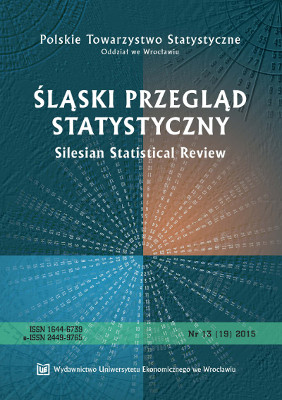Próba formalnej definicji dobrobytu
An attempt of the formal definition of well-being
Author(s): Antoni Smoluk, Janusz ŁykoSubject(s): Economy
Published by: Wydawnictwo Uniwersytetu Ekonomicznego we Wrocławiu
Keywords: state of welfare; 2/3 rule; utylity functions; Malthus’ increase; Markov’s matrix
Summary/Abstract: Well-being is a quality, and each quality has three natural states: a little, moderately, a lot. Well-being resembles happiness and health. When we have well-being, we usually are not aware of it. Certainly, we all want to live a life of well-being. While we do not specify the notion of happiness so as to avoid bad luck and not to show off with it, we do not define well-being either. It is a blessed state of existing together with nature and with people. Permanent well-being is equated with stable well-being. It is achievable only in a traditional society, where everyone knows what to do and gets it done as expected. Well-being also is associated with social Darwinism; population has well-being when it grows exponentially. Malthusian equation can be seen as a precise definition of well-being. Well-being is a holistic term that applies to a whole community as the quality of life, often equivalent to standard of living. There is no well-being on a desert island. Well-being implies work productiveness and indicates that economy is more efficient than social needs. Well-being may also be expressed by utility functions. Population’s average utility defines social well-being. Each utility function is linked to preference. If a population’s profile satisfies the ⅔ rule, then a maximal relation is preference; in fact, the very preference is social well-being. Stability of wellbeing in Markov matrixi s represented by transitions from the states: low being, being and good being, respectively, to these states. If the probabilities of transitions are as those in the matrix M, then the population is divided into three equal parts at a limit state. There are always poor people, normal or happy people and rich people. Well-being may also stand for a state of the economy – a basket of goods at which the utility function takes the maximum. Well-being is definitely related to work organization and economic situation. The world today enjoys well-being, because the net global wealth has doubled since 2000, reaching $263 trillion in 2013. The assets therefore increased exponentially. Yet, one should consider the lilies of the field, and how they grow, look at the birds of the air and think about who feeds them. The idea of wellbeing is more spiritual than material. It is in vain that you go late to rest and get up early – your effort will not gain much. Because God gives sleep to those he loves. Life is the only value affirmed by Nietzsche. Being represents a complete good, whereas not being is evil. If you exist, you have well-being. There is no well-being without equilibrium and full employment. Well-being can be measured by an index where n denotes the number of new firms established in a given year, and k – the number of closed firms. The nearer to one is this index, the better. Well-being is by no means total power, fortune and pleasure. Well-being is a state of soul, not a state of bo
Journal: Śląski Przegląd Statystyczny
- Issue Year: 19/2015
- Issue No: 13
- Page Range: 15-27
- Page Count: 13

